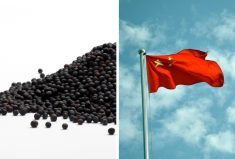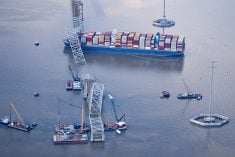Reuters – A dry bulk ship chartered by Cargill has launched on its first voyage to study how harnessing wind power can cut greenhouse gas emissions and energy use in the shipping sector, the U.S. commodities group said Aug. 21.
The maritime industry, which accounts for nearly three per cent of global carbon dioxide emissions and is under pressure from investors and environmental groups to accelerate decarbonization, is exploring several different technologies to clean up its fuel profile and move away from dirtier bunker fuel.
Cargill, one of the world’s biggest ship charterers, has been exploring wind-assisted propulsion as one cleaner option.
Read Also

KAP flags risky trade for Manitoba farmers
Tariffs, market access uncertainty, trade diversification and export infrastructure top the agenda at Keystone Agricultural Producers (KAP) annual meeting.
“It is risk taking. There is no guarantee … that the economics are going to work,” said Jan Dieleman, president of Cargill’s ocean transportation division.
“But it is up to us to show the industry what is possible and hopefully get some more people confident around this technology.”
The five-year old Pyxis Ocean has been retrofitted with WindWings, large wing sails up to 37.5 metres high that are fitted to the deck of the cargo ship. Dieleman said Cargill hopes to recoup the costs through fuel savings.
“If we are not going to get any real surprises, we are definitely going to scale this. The question is a little bit how and when,” he said, referring to other ships they could use, which were likely to be new builds.
Pyxis Ocean will sail from Singapore and head to Brazil and is likely to transport a cargo of grain to Denmark, Dieleman said. The vessel is then likely to remain in the north Atlantic area to maximize wind use.
BAR Technologies, which has designed boats for the America’s Cup, developed the sails, which were built by Norway’s Yara Marine Technologies.















